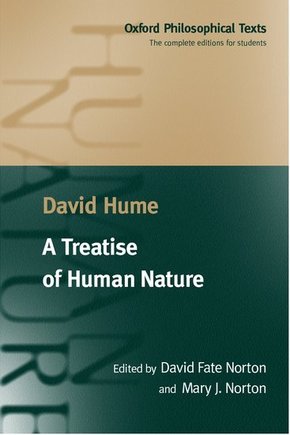
A Treatise of Human Nature - Being an Attempt to Introduce the Experimental Method of Reasoning into Moral Subjects
| Verlag | Oxford University Press |
| Auflage | 2000 |
| Seiten | 744 |
| Format | 15,9 x 23,4 x 4,2 cm |
| Gewicht | 1052 g |
| Artikeltyp | Englisches Buch |
| Reihe | Oxford Philosophical Texts |
| ISBN-10 | 0198751729 |
| EAN | 9780198751724 |
| Bestell-Nr | 19875172EA |
A Treatise of Human Nature (1739-40), David Hume's comprehensive attempt to base philosophy on a new, observationally grounded study of human nature, is one of the most important texts in Western philosophy. It is also the focal point of current attempts to understand 18th-century western philosophy. The Treatise addresses many of the most fundamental philosophical issues: causation, existence, freedom and necessity, and morality. The volume also
includes Humes own abstract of the Treatise, a substantial introduction, extensive annotations, a glossary, a comprehensive index, and suggestions for further reading.
Klappentext:
A Treatise of Human Nature (1739-40), David Hume's comprehensive attempt to base philosophy on a new, observationally grounded study of human nature, is one of the most important texts in Western philosophy. It is also the focal point of current attempts to understand 18th-century philosophy.
The Treatise first explains how we form such concepts as cause and effect, external existence, and personal identity, and to form compelling but unconfirmable beliefs in the entities represented by these concepts. It then offers a novel account of the passions, explains freedom and necessity as they apply to human choices and actions, and concludes with detailed explanations of how we distinguish between virtue and vice and of the different kinds of virtue. Hume's Abstract of the
Treatise, also included in the volume, outlines his 'chief argument' regarding our conception of, and belief in, cause and effect.
The texts printed in this volume are those of the critical edition o f Hume's philosophical works now being published by the Clarendon Press. The volume includes a substantial introduction explaining the aims of the Treatise as a whole and of each of its ten parts, extensive annotations, a glossary of terms, a comprehensive index, and suggestions for further reading.
Rezension:
These new Oxford University Press editions have been meticulously collated from various exatant versions. Each text has an excellent introduction including an overview of Hume's thought and an account of his life and times. Even the difficult, and rarely commented-on, chapters on space and time are elucidated. There are also useful notes on the text and glossary. These scholarly new editions are ideally adapted for a whole range of readers, from beginners to experts. Jane O'Grady, Catholic Herald,
